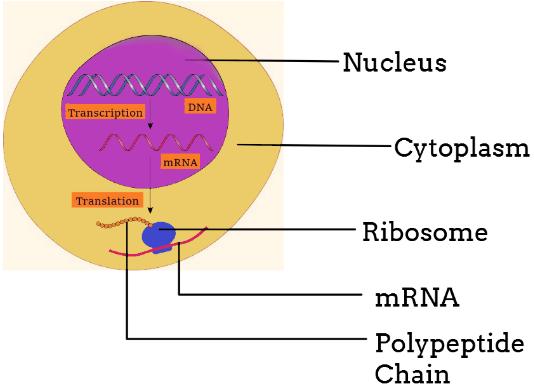Question
Question: What is the function of the nucleus in a cell? (a) It controls all the metabolic activities of the...
What is the function of the nucleus in a cell?
(a) It controls all the metabolic activities of the cell.
(b) It brings about the growth of the cell by directing the synthesis of structural proteins.
(c) It contains genetic information in the form of genes located in the chromosomes.
(d) All of the above.
Solution
A nucleus is a double membranous bound structure that performs various kinds of functions related to growth, carrying genetic instructions reproduction, synthesis, controlling various activities occurring within the cell.
Complete answer:
The nucleus is a membrane-bound cell organelle present in all eukaryotic cells and is the most evident organelle in the cell. It contains genetic or hereditary information in the form of genes located in the chromosomes. It controls all the metabolic activities of the cell by controlling the enzymes required for cellular processes. So, we can say that it is not only the storage compartment of DNA but also the home of some important cellular processes. The nucleus also brings about the growth of the cell by directing the synthesis of structural proteins.
-Nuclear membrane is the outermost layer of the nucleus that distinguishes the cytoplasm from the contents of the nucleus.
The nucleolus is the most prominent structure within the nucleus which is mainly a mass of granules and fibers attached to chromatin.
-Various cell activities like cell division and protein synthesis are coordinated by the nucleus.
-Chromosomes are present inside the nucleus that contains the genetic material genes. These genes carry DNA that provides the genetic information required for the creation of different cell components in addition to the reproduction of life.
-To make an identical copy or duplicate of a DNA is possible only inside the nucleus and the entire process of duplicating is termed DNA replication.
-The nucleus is also the site for DNA transcription which is responsible for the creation of different types of RNA from DNA.
-The nucleus is indirectly responsible for the production of proteins because the nucleus DNA is copied into mRNA, and then into proteins.
So, the correct answer is, ‘All of the above’.
Note:
-The nucleus contains the hereditary information of the cell and controls the growth and reproduction of the cell.
-Transcription would be tons like creating copies of individual pages of the human body’s instructions which can be removed and read by the remainder of the cell.
-The nucleus is the storehouse for the DNA, RNA, and ribosomes.

